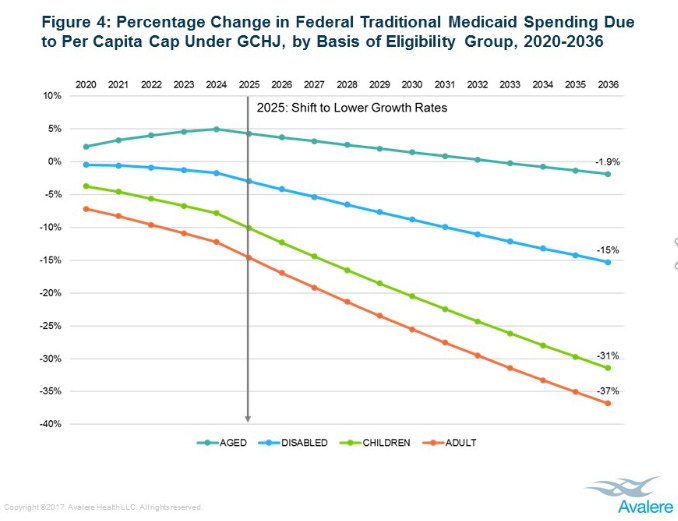Medicaid Block Grants: A Perilous Political Game of Harm
Republicans candidates Trump, Haley, and DeSantis are considering resurrecting the idea from the dead.
The specter of Medicaid block grants, a notion as persistent as it is perilous and pernicious, has once more risen out of the policy graveyard of horrible ideas.
In its latest resurrection during the Republican debate between Nikki Haley (SC) and Ron DeSantis (FL) in Des Moines, IA, earlier this week, the concept has been raised out of the ruins of past debates in 1981, 1995, 1996, 2003, 2005, and 2017.
The Haley and DeSantis Dodge: Politicians and the Medicaid Question
When CNN reporter Dana Bash asked the candidates about whether states that expanded Medicaid to low-income adults would be able to keep that coverage if they were elected president, both Haley and DeSantis dodged the question, and instead, resuscitated the zombie Medicaid block grant idea.
Haley’s response was:
So the problem with Medicaid is, it needs to be sent down as block grants. Governors can best decide how to do that, whether they need to use it towards mental health, whether they need to use it towards support services. Right now, I would send all of that down to the states.
DeSantis followed suit, failing to commit to protecting current Medicaid coverage. Instead, he said:
I think what you do is you block grant the program and then let states run the way they see fit to do. I can tell you this, expanding Medicaid leads to less private coverage. It doesn’t necessarily increase access to quality care. I want to actually people get good healthcare. It’s not just about a best sheet of paper if you don’t get any good doctors….
Best sheet of paper? What???
Anyway, these proposals would blow up the Medicaid federal-state partnership and arbitrarily cap federal funding to states with a flat amount that does not adjust for either the increasing or declining needs of states, children, pregnant women, low-income adults, people with disabilities, veterans, and senior citizens.
The Block Grant Straitjacket Threatens the Health Coverage of Millions, Particularly Children
Medicaid block grants pose a rigid financial straightjacket in which an economic recession or a natural disaster would leave states and the people who receive health coverage from it out in the cold because federal support to states would become unresponsive. This would create a horrifying zero-sum game for children, people with disabilities, low-income adults, veterans, and senior citizens to compete and beg governors for their care.
Whereas everyone in Medicaid would stand to lose, including hospitals, doctors, and other health care providers, children would likely be the biggest losers. They can’t lobby for their health care. They can’t impress upon state officials the gravity of their health care needs.
When House Speaker Newt Gingrich (R-GA) proposed Medicaid block grants back in 1995, Sen. John Chafee (R-RI) insightfully observed that kids would likely be the first to be forsaken. Chafee explained:
As states are forced to ration finite resources under a block grant, governors and legislators would be forced to choose among three very compelling groups of beneficiaries.
Who are they? Children, the elderly, and the disabled. They are the groups that primarily they would have to choose amongst. Unfortunately, I suspect that children would be the ones that would lose out.
In 2017, Medicaid caps were proposed by President Donald Trump but were thankfully thwarted by opposition from Sen. John McCain (R-AZ).
At the time, the House of Representatives proposed to subject children to Medicaid block grants but not senior citizens or people with disabilities. When the conversation moved to the Senate, the proposal that Sen. McCain voted against would have disproportionately slashed funding for children (e.g., a 31% cut for kids compared to 1.9% for senior citizens).
Everybody with Medicaid coverage would have been harmed, but kids would have been the biggest losers, particularly babies and abused children in foster care.
The Trump Administration’s Ploy to Use Children as Pawns
As if this is not bad enough, candidate Trump is, once again, proposing to abolish the Affordable Care Act and likely to cap Medicaid, once again.
What is less well-known is that the Trump Administration was also considering taking millions of children off of Medicaid and Children’s Health Insurance Program (CHIP) program coverage and moving them into the individual market. The goal was not to improve health care for children, as it would clearly make coverage for kids significantly worse, but to use kids and their lower per capita costs as pawns to help stabilize and cross-subsidize health coverage for older populations.
A Stark Warning: The Proverbial Hook in the Worm
But even if Haley and DeSantis do not care about the rather obvious negative implications of Medicaid block grants would have on the people who would or would not be covered, one would hope they just might be somewhat concerned about how such a proposal might impact their states.
A former Florida governor and my former boss, Bob Graham (D-FL), could “school” DeSantis about who this would be a disaster for Florida and other states. Since block grants are set amounts of money that do not adjust for changes in need, including economic recessions, population growth, public health disasters or epidemics, natural disasters, or medical breakthroughs, changes in any of these factors would leave states with greater need, reduced capacity, and without a federal financial partner.
As Sen. Bob Graham (D-FL) explained in 1995:
I have a warning for [governors], or more accurately a proverb for them. The proverb goes as follows: Fish see the worm, not the hook.
Those governors who are salivating, who are so anxious to gobble up block grants being proposed, will feel the hook when their economies stumble, when an epidemic strikes, when a natural disaster hits, when inflation creeps up again, or when their population grows. Worst of all, they will be held accountable in history for killing a program that actually had achieved its objectives and nurtured a national pride in providing basic health care for fragile and vulnerable citizens.
For an example of this problem, Sen. Graham talked about hurricanes. He pointed out:
.,,when Hurricane Andrew hit South Florida, Mr. President, our Medicaid caseload shot up by 12,000 people. Not only had their homes been blown away, their jobs had been blown away. Therefore, people who had been employed and self-supporting needed the assistance of Medicaid during that time of crisis.
Under block grants, a State that is knocked down to its knees by a flood, earthquake, hurricane, would not find a helping hand from the Federal Government at the time it needed help to get back on its feet. No, Mr. President, acts of God and block grants do not mix.
So for DeSantis and Haley, maybe somebody should remind them that their states have a disproportionate share of hurricanes.
Source: Number of hurricanes that made landfall in the United States from 1851 to 2022, by state, Statista
Don’t Gamble with the Health of Children, People with Disabilities, and Senior Citizens
Now is the time to make progress on improving the health care system in this country rather than threatening and gambling with the care, coverage, and well-being of millions of our nation’s children, people with disabilities, and senior citizens with the horrible idea of Medicaid block grants. If politicians want to propose putting the health care of millions of people at risk, they should start by giving up their own government health insurance coverage.
Now is not the time to turn our backs on our parents, our children, and our values.
Please contact your member of Congress and senators and ask them to oppose Medicaid block grants and to protect CHIP by making it permanent.
*****
If you would like to help ensure that policymakers no longer ignore children and their health care needs, please call your Member of Congress and urge them to protect Medicaid and support Rep. Barragán’s bill to make CHIP permanent. You could also join First Focus on Children as an “Ambassador for Children” or become a paid subscriber to help us continue our work on behalf of children.










“I think what you do is you block grant the program and then let states run the way they see fit to do. I can tell you this, expanding Medicaid leads to less private coverage. It doesn’t necessarily increase access to quality care. I want to actually people get good healthcare. It’s not just about a best sheet of paper if you don’t get any good docto”
I was on Medicaid for awhile following my divorce when I lost my health insurance. Let me tell you something it was so bad I may as well not even have had it. Never saw a doctor. because it’s run like a mill. I saw only RNs and one PA. Medicaid for me was nothing but hope in a bottle.
The dental was the worst. Appointments take months to come by, and often it’s canceled. So during that time your teeth rot! Lots of red tape!